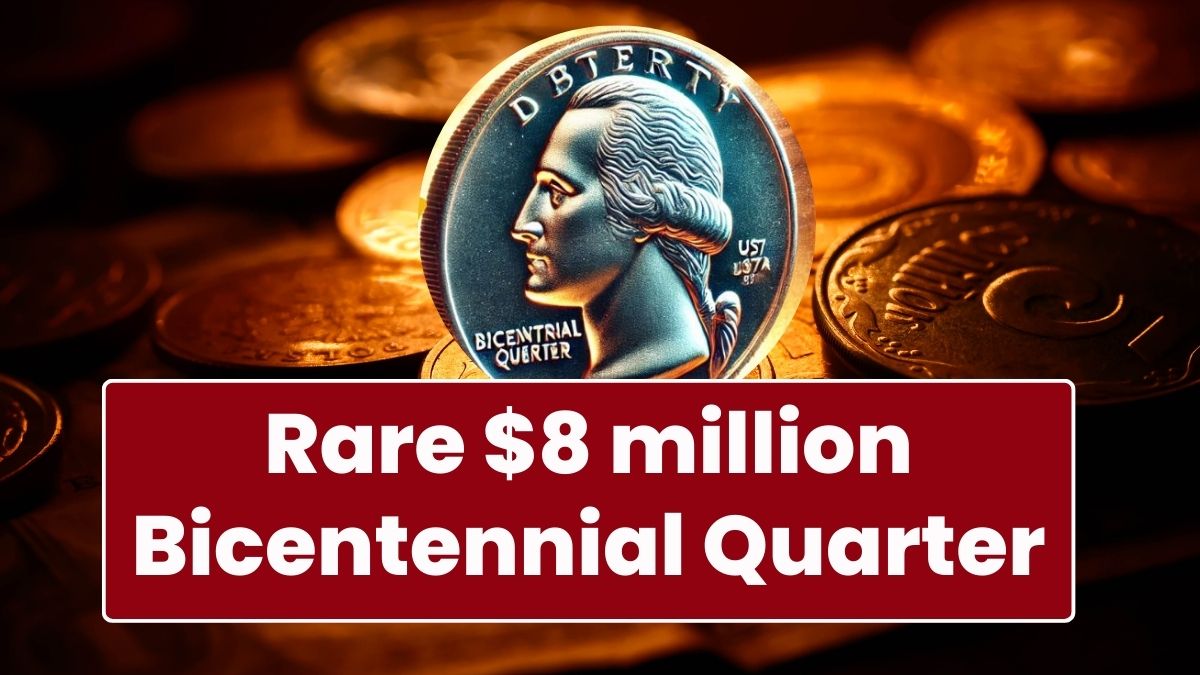American numismatics holds a special place for the 1976 Bicentennial Quarter, minted to commemorate the 200th anniversary of the United States’ independence.
Most of these quarters are common, but some rare versions have sold for as much as $8 million at auctions.
In this article, we explore the factors contributing to such high valuations and explore other valuable coins still in circulation.
Bicentennial Quarter: Overview
During 1976, the U.S. Mint issued a special bicentennial quarter with a unique design.
In addition to George Washington’s traditional portrait, the reverse featured a colonial drummer boy, a torch surrounded by 13 stars, and the dual date “1776-1976.”
It is not uncommon to find these quarters in everyday transactions since over 1.6 billion of them were minted.
How Does the $8 Million Rarity Stand Out?
A select few Bicentennial Quarters have become highly valuable due to the following characteristics:
- Some quarters exhibit rare minting errors, such as double dies or striking flaws, which greatly increase their value.
- Most Bicentennial Quarters were minted in copper-nickel clad composition, but a limited number were struck in 90% silver. Collectors are particularly interested in these silver versions.
- Especially if they are preserved in pristine condition, proof coins have exceptional detail and mirror-like finishes.
It is possible to elevate the value of a Bicentennial Quarter to extraordinary levels by combining these factors. A silver proof quarter with a prominent minting error and in mint condition has been known to fetch up to $8 million at auction.
Coins of Other Notorious Values
Due to their rarity and historical significance, several other U.S. coins have achieved remarkable valuations:
| Coin | Year | Notable Features | Approximate Value |
|---|---|---|---|
| 1794 Flowing Hair Silver Dollar | 1794 | Believed to be the first silver dollar minted in the U.S.; features Lady Liberty with flowing hair. | Over $10 million |
| 1933 Saint-Gaudens Double Eagle | 1933 | $20 gold coin; most were melted down due to the Gold Reserve Act, making surviving specimens extremely rare. | Over $7.5 million |
| 1913 Liberty Head Nickel | 1913 | Only five known to exist; unauthorized minting adds to its mystique. | Approximately $4.5 million |
| 1804 Draped Bust Silver Dollar | 1804 | Known as the “King of American Coins”; minted as diplomatic gifts in the 1830s. | Over $4 million |
| 1894-S Barber Dime | 1894 | Only 24 minted, with just 9 known survivors; features Liberty’s head on the obverse. | More than $1.9 million |
Coin Value Factors
Certain coins’ high valuations are due to several factors:
- Coins with a limited mintage or surviving specimens are more valuable.
- The value of coins in mint or near-mint condition is higher.
- History-related coins are highly sought after because they are linked to important historical events.
- Coins with unique errors during minting can increase their value and make them one-of-a-kind.
Aspiring Collectors’ Tips
Consider the following if you’re interested in coin collecting:
- Learn about coin grading systems and become familiar with key terms.
- Check Your Change: Rare coins can sometimes be found in everyday transactions; always inspect your change.
- Keep coins in good condition by handling them carefully, storing them properly, and avoiding cleaning them, because improper cleaning reduces their value.
- Consult a reputable coin dealer or grading service if you believe your coin is valuable.
Although finding an $8 million Bicentennial Quarter in your pocket change is unlikely, understanding the factors that contribute to a coin’s value can enhance your appreciation.
The world of rare coins offers a fascinating glimpse into the past and the possibility of unexpected treasures for both seasoned collectors and curious beginners.
Frequently Asked Questions
What are the characteristics of a valuable Bicentennial Quarter?
Silver composition, proof quality, or minting errors such as double dies may distinguish a valuable Bicentennial Quarter. A coin expert can provide a definitive assessment.
Does every Bicentennial Quarter have value?
The majority of Bicentennial Quarters are common and hold only their face value. Highly valuable items are those with specific rare characteristics.
What is the best way to determine whether my coin is made of silver?
Silver coins often lack the copper-colored edge that is found on clad coins. As silver coins are typically heavier, weighing the coin can also provide clues.
